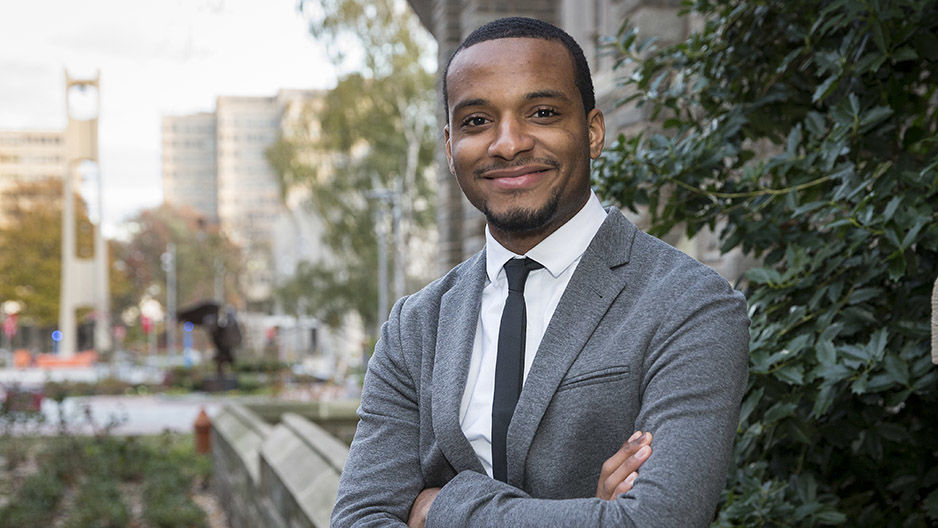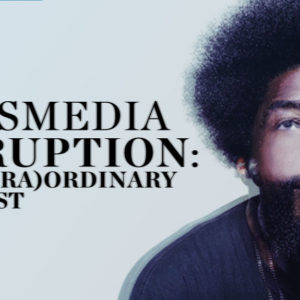Last year at this time, despite what felt like a collective bottom for our nation and our world, we made sure to carve out space to reflect and express our thankfulness—to friends, colleagues, and creators who take turns keeping us grounded and helping us soar. It’s been twelve agonizing months since the human rights disaster of November 8, 2016, and many of our greatest fears have been realized. Our friends and neighbors live in fear. We’ve lost loved ones. We’ve lost more heroes, icons, and influences. Being on the bottom is a continued exploration of its own depths and complexities.
But still we give thanks. We give thanks for music, a great comfort and a galvanizing, life-giving force in times of collective darkness. We give thanks for our forebears, who walked paths often harder than our own so that we might follow and push onward. We give thanks for our colleagues, families, and friends, who inspire us and push us onward when the going is hard.
Thanksgiving is a fraught holiday with a problematic history and an uncomfortable place in this white supremacist capitalist patriarchy, an outgrowth of colonial plunder, the enslavement of our ancestors, and the continued subjugation of the world’s suffering peoples. Giving thanks in the face of it all feels disingenuous. Many far less fortunate have less to be thankful for.
But still we give thanks. We give thanks for those who keep fighting, and use their work to give us new tools with which to fight. We give thanks for those who create spaces for us to laugh, proffering fleeting moments of escape from a hard, cold world. We give thanks for those who comfort us, those who hear us, and those who give us strength to keep on.
Our sincerest hope is that, by sharing them, you’ll gain strength, motivation, solidarity, or comfort in the days to come as we have. And we hope to continue to be a force of celebration, criticism, persistence, and strength in the days to come.
The Family Business

Our genius, Kellie Jones, is a constant source of inspiration and light for MusiQology. And our foremother (and her birth mother) Hettie Jones provides the vital spark that reminds us we are part of a critical genealogy of thinkers and workers. We’re thankful for them, and thankful to announce programming next Thursday, November 30, at 6PM at the Penn Book Center, where the two will discuss their recent books, Kellie’s South of Pico and Hettie’s Love, H.
Colin Kaepernick’s Silence
We write weekly about sounds and the influence of sonics in our cultural landscape, but one of the loudest gestures in our mediascape has been the former NFL QB’s silence as a league that could benefit from his presence continues to systematically blackball him. Journalists continue to mine Kaepernick’s unusual silence, we should remember, is a paradigm shifter in contemporary discourse; while enabling rich profiles by GQ and Rembert Browne among others, it has enriched our understanding of what activism looks and sounds like. It is also an important sacrifice: He has allowed himself to become a prop for protesters to follow him and for the ignorant to twist his message and excoriate him. That bravery—his silence—has itself become a daring political gesture. His point—that America unfairly criminalizes, jails, and kills its black citizens—remains unassailable despite all the noise that attempts to quiet it. And when a decision to kneel began this, he stands with dignity—in Africa, in Harlem, and in the communities he is working quietly to aid.
Mhysa’s Experimentations

We’ve been following the work of E.Jane, an experimental Philly sound and visual artist, for a few years. With the release of Fantasii, their work has entered the space of critical acclaim. That has not blunted their frankness, though: Their social media and public comments speak honestly to the financial and spiritual trials facing black artists working in worlds (academic, artistic, musical) not made explicitly for them. E. remains clearly and specifically focused on making musical and art-conceptual spaces for resistance, expressions of femininity, and the radically resistant potential of banality. She inspires us constantly.
Colleagues and Mentors
These words direct from Dr. Guy: “Despite what I share on this platform, this has been a most challenging 2017, probably the second worst of my spins around the sun. But it’s also been one of fulfillment of some spoken and unspoken goals. The year is closing with my joining with two dynamic leaders in my life Leslie D Callahan and Marc Lamont Hill. Truth: I’ve always wanted to be and be *known* as a leader ever since kindergarten, I think. That might not be my gift, though because, honestly, it seems the thing I’m the best at is supporting and assisting leaders I respect and believe in. I spend a lot of time in a behind-the- scenes and under-the-radar way helping others with their projects and goals; it must be what I’m called to do–it’s natural. I’ve witnessed the great way these two touch people’s lives, how unselfish they are with their energies and time and how they work and speak for my other passion: the people who struggle on the bottom of society–those lacking voice and resources. While I don’t get to speak to large swaths of people about justice issues in the way that Callahan and Hill do (I’m in the “ministry or culture”), I hope to contribute support to the visions of these young leaders. I’m hoping 2018 will be a better one, a year in which I better align my aspirations with my realities. And that my dreams about community-based art will find light.
Ta-Nehisi Coates’s Honesty
Listening to Ta-Nehisi Coates speak—as we had the opportunity to do at Penn earlier this month—is a particular experience. He pulls no punches, makes no apologies, and gives no one a pass. The book tour for his latest work, Eight Years in Power, has produced sold-out rooms throughout the country and intense, specific conversations from the n-word to the craziness needed to support whites’ intense possessive investment in the world they’ve built to suit themselves and their needs. This commitment to truth often feels pessimistic, and critics of Coates are quick to jump on him for foreclosing certain possibilities and making envisioning new futures harder. But he remains a steadfast realist who asks more from his readers, white Stans, and himself for such a reading to be sufficient. “Art was not an after-school special,” he writes. “Art was not motivational speaking. Art was not sentimental. It had no responsibility to the hopeful or optimistic or make anyone feel better about the world. It must reflect the world in all its brutality and beauty, not in hopes of changing it but in the mean and selfish desire to not be enrolled in its lie, to not be coopted by the television dreams, to not ignore the great crimes all around us.”
Daily Reminders of Black Excellence
Earlier this year, we highlighted the work of Dr. Guy’s daughter, Candace Ramsey, whose 365 Days of Black History project profiled a different black celebrity each day. As the yearlong campaign has gone on, we’ve found satisfaction in the routinization of the practice—the everyday ordinariness (and concurrent significance and exceptionalism) of black excellence. These profiles across time and subject area are a constant reminder of the diversity of contributions to the richest pieces of the fabric of a (flawed) nation.
Chance the Rapper’s Worldview
While it’s been a hard year, one of the constants of persistence and positivity that holds us up is Chance the Rapper, a one-man bundle of joy whose infectious optimism in the face of hard times is infectious and impossible to deny. He reminds us that more is possible and that we, together, can impact the world around us. We could’ve shared a dozen of his songs and impactful good works, but we chose this recent SNL sketch because it combines levity with seriousness, allowing us to crack a smile even while acknowledging the long road ahead. It’s also pretty catchy.
The Next Generation

We do political work always with an eye towards the future, hoping that seeds sown now will make our circles (like the academy) better for those who come after. At the vanguard of any next generation will likely be people like Hazim Hardeman, a Philly resident and recent Temple graduate who just won a Rhodes Scholarship. With a set of interests including hip-hop, prison abolition, critical pedagogy, and black intellectual history, his story as a community college graduate and Philly local inspires us. We’re anticipating great things and thankful for the hope he gives us.
Art is Medicine

Nina Chanel Abney is an American artist. She was born in Harvey, Illinois, and lives in New York City. Her latest showing “Seize the Imagination” and “Safe House” is on display at the Jack Shainman Gallery and Mary Boone Gallery through Dec 20th. Her work explores themes of refuge and safety while at the same time countering pessimistic and nihilistic mainstream narratives about black lives. She offers up black joy as a means of resistance.

 Share On Facebook
Share On Facebook Tweet It
Tweet It




